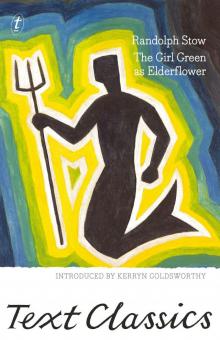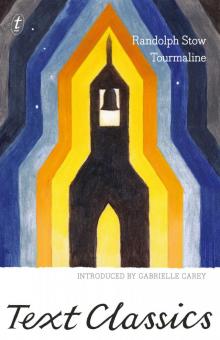- Home
- Randolph Stow
To the Islands Page 10
To the Islands Read online
Page 10
Stephen said, quietly thrusting after the white man: ‘Might be you better yell out, brother.’
‘You do the yelling. You blokes know how to make yourself heard.’
The brown man stopped and shouted: ‘Bau!’ through his cupped hands, and waited, but there was only the echo returning, muffled by trees, from the cliff. He shouted again.
‘Leave it,’ Dixon said, ploughing on. ‘We’ll go farther.’
So they continued, crawling under bowed trees, avoiding saw-toothed pandanus leaves, breaking through creepers and through low wattles, and came finally past the pool to where there were only rocks, round boulders worn by water and smooth under boot-leather, with clumps of spinifex growing between.
‘Any use going on?’ Dixon asked.
‘There one more pool, brother.’
Dixon took off his hat and wiped his forehead. ‘You lead the way,’ he said.
Walking behind the native he felt, suddenly, regret at his own awkwardness, for Stephen moved over the rocks with the sureness of a bird, but he stumbled and slipped, having always to plan his next step, to tread carefully. He saw himself for the first time as a stranger, cast without preparation into a landscape of prehistory, foreign to the earth. Only the brown man belonged in this wild and towering world.
‘What do you think about all this, Steve?’ he asked abruptly.
‘What that, brother?’
‘Heriot sort of adopted you, didn’t he? And isn’t Justin your cousin’s husband?’
‘Yes.’
‘You must be wondering what’s happened to them.’
‘They reckon they come out camping and get lost,’ Stephen said.
That was Way’s thin story, and he was pretending to believe it. Dixon grinned wryly, picking his way along behind.
The stones gave place to earth and canegrass and they arrived among trees again, before a little pool so sheltered by cliffs that lilies still floated delicately on its water, untouched by the late wind and rain. The cliff opposite had been split in halves by a landslide, and a huge passageway littered with boulders ran up through it, ending in a rock wall and the sky. The enormous chunks of rock thrown down in the ruin stuck up sharply at the pool’s edge, or rose out of it like islands, and from among them, twisted and tortuous, a wild fig tree thrust out its branches of dark, shining leaves towards the water.
Stephen said: ‘Brother—some people reckon Brother Heriot went to finish off himself.’
Dixon stared at the cliff. ‘It might be true. Sorry, but you ought to know what’s going on.’
The world was utterly silent. ‘Brother, why he do that?’
‘I don’t know, Steve.’
‘I thinking—I thinking might be he do it—because of me, brother.’
‘Ah, come off it.’
‘Because—I’m no good, I’m thief, no good. And my sister—you know? That why I think that, brother.’
‘You’re up the pole,’ Dixon muttered uneasily. ‘Just help me find him, don’t worry about yourself.’
‘I going to help you, brother. That old man, he just like my father to me.’
‘Well, give him another shout, then.’
The man cupped his brown hands to his mouth and shouted: ‘Bau!’ over the water, and got it back again as a far, desolate echo. ‘Nothing,’ he said, in an empty voice.
‘Let’s go back.’
‘I coming, brother.’
Returning over the stones, looking at the high rocky hillside between the two pools: ‘You could climb up there,’ Dixon said. ‘You could look down over the whole place. You coming?’
Stephen nodded, they moved across the stones to the hill, climbing up steps of rock and up the rock bed of a vanished creek and among red boulders in canegrass. Dixon panted, swore involuntarily when he slipped on canegrass stems flattened over rock. Stephen showed tender concern.
Coming finally to the top of the hill, where meagre gums grew from rock, they stopped for breath before tramping on to the cliff. A wind had come up across country, stirring the leaves and the tall grass. Dixon opened his shirt and felt it cool on his sweating chest.
At the edge of the cliff, on an overhang above the water the country filled his eyes, beauty struck at him, and in a strange stillness of mind he recognized it. He looked at a land of rock, a broad valley between cliffs and hills, even the floor of it studded with broken stone. But the pools were bright blue under the sky, and the endless hills blue also. In some places the water was almost obliterated by lily-leaves and grass, in others fringed with dense trees and pandanus. Below him, many miles down, he thought, lay the Onmalmeri pool, shrunken by distance, dark, dark green among its thickets of wattle and pandanus, its creeper-choked gums. He picked up a stone and threw it far out, and it swerved and landed with an echoing clatter in the clump of pandanus at the cliff foot. A cry of birds broke out.
On the far bank, beside the smoke of his fire, a tiny man, Gregory, looked across at the noise. The toy horses started and stared.
What am I thinking? Dixon asked himself. But it’d be easy to give up here, to get out on an overhang and drop into the water. That’d be a death to die, you could easily do that, with the water just about calling you on. Wonder if those little crocs would eat a dead man, they don’t touch live ones.
Gregory had seen them and called out, his voice rising, magnified by echo, so that it seemed impossible such sound should come from so small a figure.
‘Bau!’ shouted Stephen over the empty country. ‘Bau! Bau!’
But there was no answer beyond echo, and presently Gregory called: ‘Nothing?’
‘Nothing,’ Dixon repeated. The lonely echo threw up in its broken voice: ‘Nothing.’
In the narrow gorge, sunset firing the farther cliffs, Heriot sang to himself, under his roof of rock, songs of loneliness and silence.
Presently he himself lapsed into silence, listening to the rapids downstream, watching the shadow slowly creep up the cliffs. His blanket smelt of acrid woodsmoke, and his clothes, and his skin, an annoyance that Justin did not notice, being inured to sleeping all night in the stink of burning cadjiput branches.
‘I should have gone to Onmalmeri,’ he said. ‘I wouldn’t feel so closed in there.’
‘No, brother,’ Justin said automatically. He sat, idle and bored, propped against the cliff base, on a rock beside a few bream which he had speared in the pool with his prong-wire.
‘We’ll go on, we’ll go tomorrow.’
‘Yes, brother.’
‘Le silence éternel de ces espaces infinis m’effraie.’
‘Yes, brother.’
‘You’re not listening,’ Heriot said bitterly.
‘I were thinking, brother.’
‘We’ll go on, as soon as the sun gets up, tomorrow.’
‘Yes.’
Four brolgas, attenuated and grey, crossed the sky with a long purring crake like the opening of an old door. Heriot sat up.
‘What are you thinking?’ he demanded.
‘Nothing.’
‘Damn you,’ said Heriot.
‘What that, brother?’
‘Damn you, damn you, damn you,’ whispered Heriot to the sky. ‘You do me wrong, you do me wrong to take me out of the grave.’
*
When the fire had died down, Dixon in his sleep became vaguely conscious of the absence of light on his eyelids, and woke, and threw more wood on it. It crackled, then bloomed into flame. The great flame of fire, he thought, remembering Justin’s voice. The light in its first blaze leaped to the edge of the water, then darkness pushed it back.
One of the blanketed sleepers stirred. ‘That good, brother.’
‘You awake, Gregory?’
‘Little bit.’
‘Not scared of the ghosts?’
‘No, I not scared. But I don’t like sleeping in this place, brother.’
Crawling back to his blanket: ‘I don’t go much on it, either,’ Dixon confessed.
He lay still. Far aw
ay up the valley a dingo howled, and howled again, lonely, forsaken.
But that’s not it, he thought. He drifted into sleep again and dreamed of a dark woman with her child, and he was full of grief. Don’t do that, he said, don’t cry. But she was bent over her child. Wawai! wawai! wawai! she crooned, rocking the baby to sleep.
In the morning Heriot woke happy, light filled the gorge and reached his bones, he felt careless and at ease. Justin, at the fire, grilling his fish, looked up warily and saw the old man’s face, and smiled, whitely and warmly. ‘You feeling good again,’ he said.
‘Very good,’ said Heriot, squatting beside him. ‘Ah, you’re a good man, Justin, you even brought salt.’
‘Those horses pretty glad we going,’ Justin said, jerking his head towards the impatient Albert Creek. ‘Look ’im, eh, real hungry for grass.’
‘I’ll go for a swim,’ said Heriot restlessly. ‘I’ll be clean.’ He walked briskly down to the sand and the water, and he was upright and strong. When he had dragged off his clothes he considered his body and thought that it was younger than his mind.
Across the fire Justin watched him enter the water, balancing cautiously on the slimy sunken rocks, his body white as a tree-trunk but with dark-brown forearms and neck that did not seem to belong to it. A trace of compassion touched the dark man’s thick mouth as he applied himself to his cooking.
When Heriot came out of the water his hair was flattened in strips over his forehead and drops hung in the white stubble on his face. He dried himself perfunctorily on his shirt, and dressed. His clothes stank, he discovered, but was not distressed. He went back to the fire and found Justin had finished his preparations; there was a billy full of tea and the fish was good, fine and juicy. ‘Ah, you’re a good man,’ Heriot threw out vaguely.
When he had eaten he pulled out his tobacco tin, looked in, frowning uncertainly, then closed it again and gazed into the fire.
‘I got cigarette if you wanting one,’ Justin offered.
‘I’ve got some,’ said Heriot, ‘but I should save it. Matches, too. Oh, what does it matter?’ demanded Heriot of himself. ‘When it’s gone, it’s gone.’ He opened the tin again and rolled a cigarette.
Justin asked diffidently: ‘How far we going, brother?’
Lighting his cigarette at the fire, puffing smoke: ‘I don’t know,’ Heriot replied.
‘Brother—’
‘Well?’
‘I know why you come out here. That why I followed you. I knew.’
‘What?’ asked Heriot. ‘What did you know?’
Justin said softly: ‘You were going to—going to kill youself, brother, with that gun.’
Heriot sat unmoving in front of the fire, his back to Justin: ‘How did you know?’
‘It all over you face, brother. And that gun in you hand—I knew.’
‘Justin,’ said Heriot harshly, ‘Justin, you should have left me alone.’
‘I couldn’t do that, brother. Following you, that was only thing I could do. If,’ Justin said, with a protest in his voice, ‘if you was black fellow, I could take that gun and say: “You don’t do that, go home now.” But you can’t say that to white man, you can’t do nothing, only follow.’
‘I don’t want to die,’ said Heriot, pleading with someone. ‘Not today.’
‘Come back to mission. Please, brother.’
‘I can’t go back.’
‘You saying you don’t want to die.’
‘Justin,’ said Heriot. ‘You don’t know what I’ve done.’
He turned, and the look on the craggy face silenced Justin.
‘Rex is dead, he was dead when you left, lying outside in the wind. I killed him, Justin. Now I have to die.’
Smoke from the fire drifted between them as they watched one another.
‘It’s no good your following me, I can’t ever go back. But I want to live now, as long as I can. I want to go on and on. And I’m afraid to—do justice to myself. I can only—give myself to the country, and let it do what it likes with me. That would be God’s justice.’
‘Maybe Rex not dead,’ Justin said unsteadily. ‘Sister Bond, she real clever, she fix him—’
‘Can’t you see, it doesn’t matter if he’s dead or not. All that matters is that I wanted him dead. But he died. I know. Sister Bond can’t raise Lazarus.’
With a sudden movement of despair Justin reached for the rifle and pulled it across his knees, slipping the safety catch. ‘Brother,’ he said thickly, ‘I sorry, but you got to come back.’
‘Oh, Justin,’ said Heriot, softly, smiling, ‘if I believed you’d shoot me, I’d kiss your feet.’
The brown man was baffled by his sincerity, he laid the rifle down on the ground. And Heriot, reaching out, seized it.
‘This is a ridiculous charade,’ he said, sourly grinning, ‘but I have to make you go back. I’m going nowhere. Ella and your children need you and you need them.’
‘I can’t go back!’ Justin protested, with bewilderment and anger. ‘If I go back, what they going to say? They going to say I let the man what murdered Rex go away, and they going to say I let Brother Heriot kill himself, and they going to say I was scared to know what to do. Ella and my little kids going to say the same, brother.’
‘No one will blame you. They know I killed Rex, and they know I can’t live in this country.’
‘Might be Rex not dead. Then it would be like I kill you, brother.’
‘Go home,’ Heriot said.
‘I never going home, brother. You can’t stop me following you, only if you shoot me. I know what right, I not leaving you.’
‘I see,’ Heriot whispered. He began to tremble, a nerve twitched near his mouth and his tongue was stiff with nausea. ‘There’s only one thing I can do.’
As he stood up Justin leapt at him and seized the rifle, and they struggled for it, thigh to thigh, in absolute silence, the black man and the white, with the murmur of water drifting up from below the pool and the horses restlessly watching from the sandbank. When the shot came, the cliffs took it and threw it back and forwards between them like a sharp, close crack of thunder, and the men froze. Then Justin stepped back, holding the rifle.
Heriot swung away and went to his horse, and saddled up, Justin all the time silently watching. He led it to the rock shelves, and mounted, and rode on.
When he had gathered up blankets and bags Justin followed and overtook him. And all morning they climbed in silence through the ranges, among rocky hills capped and feathered with grey-green cypress pine, and at noon they came out on a broad tableland and a thicket of saplings through which the horses pushed and strained irritably.
Green budgerigars shrilled through the air, and there appeared briefly two blue parrots, crimson underwings glowing against the sky.
In the silence after their going Heriot sang.
Gunn was with Way in the office when Dixon came back, and both turned quickly to hear him as he appeared at the door. But he only shook his head, hot and weary after the long ride, and sat down on the step.
The room sweated in the afternoon sun. ‘So it’s no good.’ Way said. ‘He wasn’t there.’
‘No.’
‘I’d better tell you, Terry, about the telegrams.’
‘What telegrams?’
‘Two came from the council today, one for Heriot, one for me. Here they are, if you can read my writing.’ He passed into Dixon’s reaching hand a sheet from the pad beside the wireless, and waited. Dixon’s mouth formed the words as he read.
‘Well,’ he said finally, ‘that puts us right. No doubt about it now.’
He pushed the sheet of paper back across the table and it lay there, by Gunn’s hand, with its messages pencil-scrawled by Way. Heriot. Telegram 21 March received resignation reluctantly accepted many regrets good wishes. Way. Please accept position acting superintendent as Heriot arranges.
‘There you are,’ Way said.
‘What do we do now?’
‘I think we
report it. The telegrams should be enough justification. If he resigned on the morning he disappeared it’s pretty clear what he meant to do.’
‘And then what happens? Search plane go over?’
‘Probably.’
‘You beaut. Wait till the money starts rolling in. Stories in the paper. “Man lost in rugged country.” Old ladies and gents remembering there’s a mission here and shaking up the moneybags.’
‘We mustn’t be mercenary,’ Way said, in a disciplined voice. ‘Not yet.’
‘I don’t believe in it now,’ Dixon confessed. His eyes were full of huge landscapes, it was hard to be concerned with the fate of one ant-like man.
‘I have to remind myself now and then. It seems as though he’s been gone for years.’
Gunn said: ‘What good would a plane do? It wouldn’t pick out men on horses, except maybe if they were moving across open plain. You’ll need a land party.’
‘But how’re you going to know which way to go?’ Dixon demanded, ‘unless a plane goes over and spies out the most likely way they’d have taken.’
‘I want to go and look for him. Starting tomorrow.’
‘You can’t go,’ Way said firmly. ‘You’ve got the school. You can’t leave that.’
‘Helen could take it. The Education Department needn’t know.’
‘You can’t go,’ Way said decisively.
‘Have to be my job, anyway,’ Dixon added. ‘Forget it, Bob.’
‘Ah, kick me, spit on me,’ Gunn said, ‘roll me in the dirt. All right, I’m no use.’
Way said: ‘No insult, but leave the dirty work to your tribal elders. We’ll struggle through.’
‘Well, I hope Mr Heriot’ll struggle through. Do you think he’ll be out there waving his little white hanky when the plane goes over?’
There was a silence, and then they began to laugh, all three of them, without any reason except that they felt tired and puzzled and none of them had been quite listening to the others. ‘Ah, heck,’ Dixon said at last, ‘it’s not funny, but you’ve got to laugh, I don’t know.’
‘Aren’t we cheerful?’ Way remarked. ‘Funny thing.’
Dixon got up slowly and stretched himself. ‘Heriot not being here,’ he said, ‘that makes the difference.’ He scratched himself and made monkey noises. ‘I feel drunker than I’ve felt since I was drunk.’

 The Girl Green as Elderflower
The Girl Green as Elderflower Tourmaline
Tourmaline Visitants
Visitants To the Islands
To the Islands The Suburbs of Hell
The Suburbs of Hell